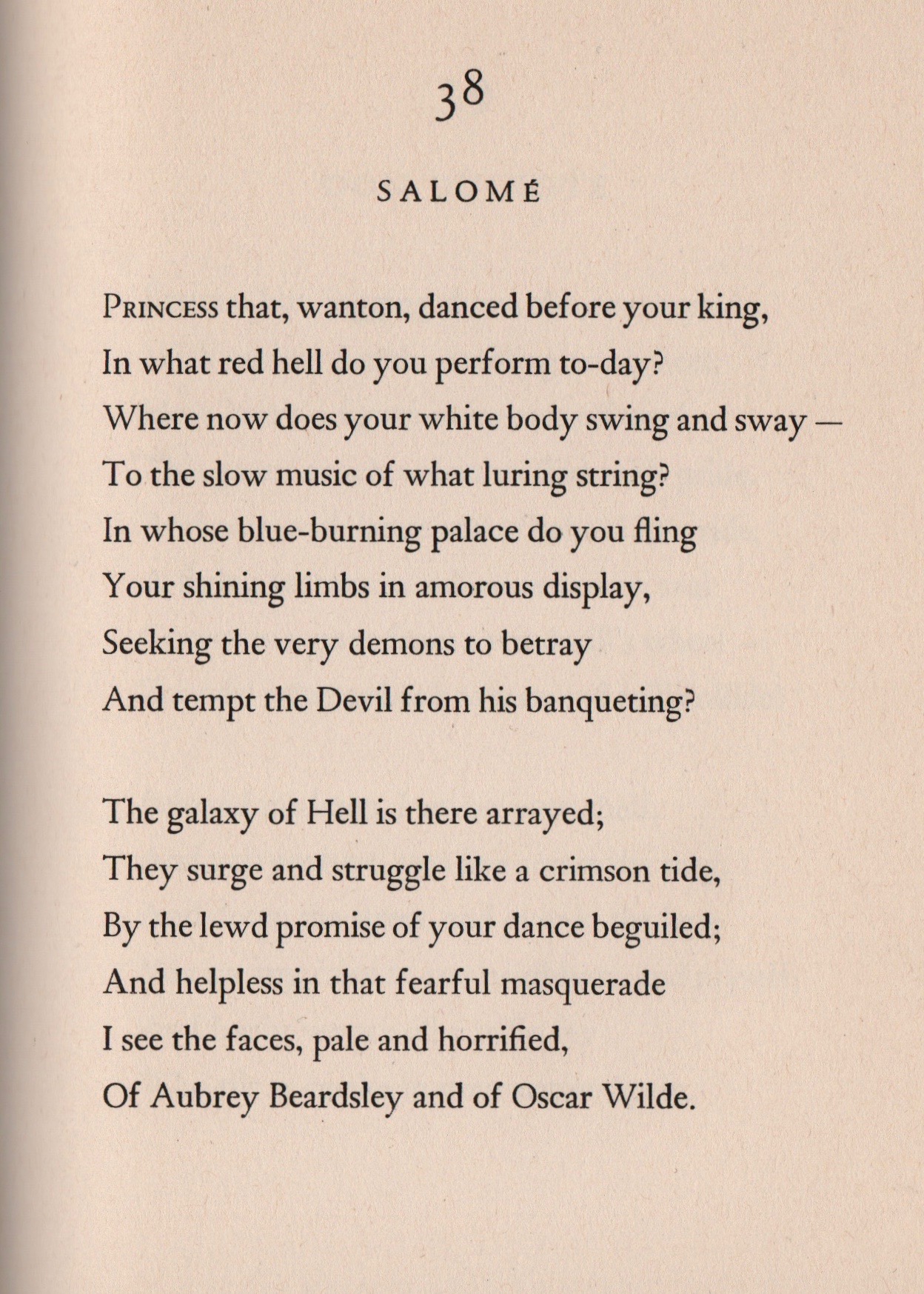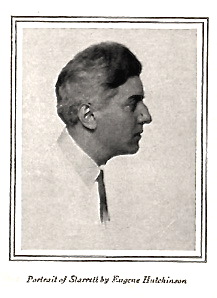Salomé
That Dancing Queen Sure Gets Around
The least provocative illustration by Beardsley for Wilde's playscript. Beardsley's drawings were so audacious that Wilde worried his play would be remembered only as the type around Beardsley's work.
Salomé has been an inspiration for poets, painters, playwrights, composers and story tellers of all stripes for centuries. The story goes back to the New Testament, and she became an image of scheming femme fatale whose licentious dance so bewitched King Herod that he offered her anything in return, even half his kingdom. Instead, she asks for the head of John the Baptist on a plate. Herod orders John's execution and his head is delivered as requested.
Although unnamed in the Gospel accounts of Matthew and Mark, history soon tagged her as Salomé and that's how she has come down to us.
To those of the late Victorian, early Edwardian age, the most infamous incarnation of the legend was Salomé, a 1891 play written by the always controversial Oscar Wilde. His play was first produced in France, where you could show a actress lifting a prop prophet's bloody head and giving it a kiss without going to jail, as you would in England where such productions were banned from the boards at the time.
Equally audacious artist Aubrey Beardsley produced even more audacious illustrations for Wilde's script and a banned book was born. By the way, Wilde's stage direction in the script became the origin for the term "Dance of the Seven Veils," that has come down to us today.
While Vincent Starrett's tribute never got him arrested or banned, it did have a curious history which I'm still trying to complete. What I do know is that there appear to have been two versions of the poem. Here's what I know so far.
The cover to the rare first edition of Estrays, the work of four "up and coming" Chicago poets, published in December 1918 at The Camelot Press in Chicago. The initials of the four poets are on the cover: Thomas Kennedy, George Seymour, Vincent Starrett, and Basil Thompson. There were only 250 printed.
"Salomé" is one of Starrett's earliest poems. It was also one of his favorites, and shows up in his earliest and best-loved anthologies.
I have to admit at the start that I am likely missing the poem's first appearance. Chances are it showed up in a newspaper or obscure magazine somewhere in the mid to late 1910s.
That's just a guess, but I think it is a reasonable one based on the publication of other poems written by Starrett during ths period.
The first publication that I can find is in the first edition of Estrays, a rare paperback from December 1918 and produced by the The Camelot Press in Chicago. It could well have been a vanity publication, with each of the four young buck poets putting up money to get their work between paper covers and hoping it would bring them additional recognition.
Again, that's speculation, but the pamphlet's small press run (there were only 250 printed) and inexpensive quality is suggestive.
Thomas Kennedy, George Seymour, Vincent Starrett, and Basil Thompson were the four relatively young men represented in Estrays. (Starrett would remain close to Kennedy and Seymour for many years, although he says less about his association with Thompson.) *See note at bottom.
There was a second edition of Estrays, published in March 1920 by The Bookfellows of Chicago. "Salomé" is here, along with a few poems that didn't make it into the first edition. Like the pamphlet, this was also a limited edition, of just 300 copies.
The first published version of "Salomé" that i can find, this is from the 1918 pamphlet Estrays.
Starrett's poem asks where Salomé performs today, and suggests she continues to dance, not on any Earthly plane but in Hell, "and tempting the devil from his banqueting," just as she had beguiled Herod. He paints a picture of her "white body" that swings and sways while her "shining limbs" are "in amorous display."
(Back in a sec. Sorry, I had to get a drink of cold water. This is hot stuff.)
Starrett then takes it a step further by suggesting that among the damned who watched her dance, "the galaxy of Hell there arrayed," were none other than Beardsley and Wilde, "pale and horrified."
Well now.
Starrett wasn't a prude. Far from it. He broke with his mother's form of conservative Christianity as a young man and enjoyed the life of a handsome, articulate, well-read man about town. I have to admit I was taken aback when he tosses Beardsley and Wilde in Hell, "pale and horrified." In other places he writes admiringly of their work.
But there you are.
The annotated version of "Salomé" that is in Fridolf Johnson's copy of Starrett's 1923 book of poetry, Banners in the Dawn.
Three years after the poem appears in the second edition of Estrays, Starrett had his first solo book of poetry published by Walter M. Hill in Chicago, Banners in the Dawn. "Salomé" was one of the 64 sonnets included in the book.
But it appears that Starrett was not happy with the version published in Banners in the Dawn.
As you can see by the page reproduced here, Starrett made numerous changes to the text. This was the same text has had been printed twice before in the two editions of Estrays. Was the earlier version changed by an editor? Did Starrett decide to tinker with the language in between its publication in Estrays and then in Banners in the Dawn? Starrett did like to rework his earlier pieces. Sometimes it was just a bit of punctuation, but on other occasions he made substantial alterations, like you see here.
At any rate, Starrett edited the published version for his friend, the artist Fridolf Johnson. There's a bit more about their friendship and Johnson's fascination with Salomé here in a 2014 posting.
(Careful readers who have jumped back and forth between the 2014 blog post and this one will note that in the intervening four years, I've learned how to put the é in Salomé. We do progress.)


What prompted all this speculation was my recent purchase of the typescript for Autolycus in Limbo, Starrett's 1943 collection of verses, the one he considered his collection of favorites. (Check out the large image that leads this blog.)
As he had done in previous collections, Starrett included "Salomé" in Autolycus. Part of the Autolycus manuscript included the typed version of "Salomé," but it was different than the previous poems published in the two editions of Estrays or in Banners in the Dawn. This time he included all of the changes made in his annotated version in Johnson's copy of Banners. If there is to be a definitive version of the poem, this is it.
The changes may be slight, to be sure, but they are numerous and significant enough: "your King" instead of "the King"; "slow music" for "mad music": and "In whose blue-burning palace do you fling," for the earlier "In a blue-flamed salon I see you fling," and so forth. Beardsley and Wilde are still suck in hell, pale and horrified. But the changes were important enough for Starrett to make them on Johnson's version and to see they were made when it was printed in Autolycus, nearly 20 years after its first book publication.
If you've made it this far, thank you. I know there are times when I fall down the rabbit hole over minutia, but I love this kind of stuff. And it's the thought that a few of you might have followed me to this point that makes it all worthwhile. See you next time.
* Here’s a later addition: Basil Thompson was one of the founders of The Double Dealer, a “little magazine” that Starrett wrote for in the 1910s.
Thompson's own book of poetry. Auguries was published in 1919, but was immediately suppressed by the author. He sent a copy to Starrett, who wrote critical thoughts about the author on the back page:
"Poor Basil! I suppose his "poetry" is the worst that has been written and published in the history of books. He had the sense, however, to suppress this volume, and the action should be charged to his credit." Starrett characterizes Thompson as "a strange and complex fellow, a remarkable drunkard and a magnificent Catholic... His poorest pieces are products of torture that might have produced masterpieces. V.S."
